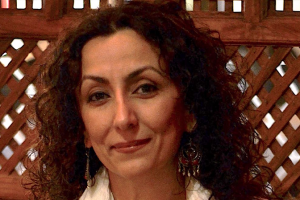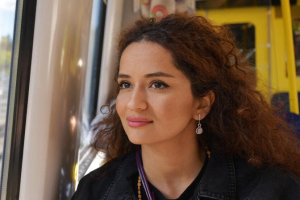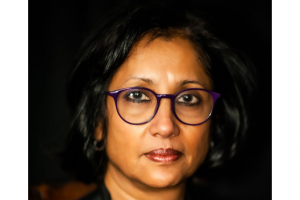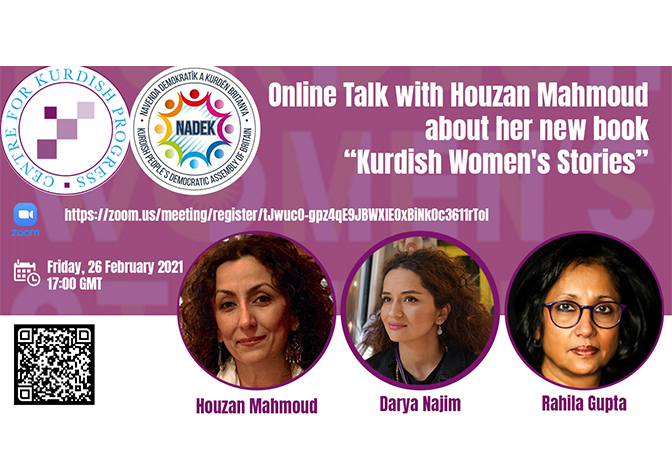Friday, 26 February
at 5pm GMT
Html code here! Replace this with any non empty text and that's it.
Html code here! Replace this with any non empty text and that's it.
Rahila Gupta, a writer, journalist, and political activist, presented the book launch and introduced the main speakers, Houzan Mahmoud (the editor of the book) and Darya Najim (the translator of many of the stories). Gupta mentioned that she is delighted to be chairing the launch of this unique book, which brings writers from all parts of Kurdistan. Gupta provided a brief account of the Kurdish question and highlighted the suffering the Kurds have been experiencing. Then she offered brief reflections on some of the stories that are included in the book. Gupta emphasised that one thing that unites these stories is the theme of strong and rebellious women. There are recurring themes of resistance against patriarchal controls over women’s freedom, state repression of Kurdish communities, loss of homes and family members, and women resisting victimhood. These stories show the diversity of experience of Kurdish women.
Gupta introduced the first speaker Darya Najim, who began by thanking Houzan Mahmoud for giving her the chance to be part of the project and translate the Sorani language stories into English. Najim started her comments by posing four questions that she went on to answer in her talk. They were: ‘What is a project?’ ‘What is a feminist project?’ ‘What is translation?’ and ‘What is feminist translation?’
Najim said that a project is a collaborative work where a group of people work towards achieving a particular goal. Kurdish Women’s Stories, in that sense, was a project that brought a group of stories together, and the goal was to give Kurdish women a platform to make their voices heard. She said this book was the only project that embodies Kurdish women’s struggles and stories exactly as it is, and more importantly, it is told by women. Then, she moved on to the second question of what is a feminist project? She said a feminist project is a collaborative work by a group of women who are brought together to expresses their struggle in the feminine. A feminist project can express inequalities even if it cannot provide a solution to these inequalities. This project was focused on showing the realities of women.
For the third question, Najim said ‘a translation is a process of turning a given text from one language to another’. She said the history of translation is not unique and as old as other fields of knowledge. It is a very male-dominated field and to translate women is a very difficult task as the field itself lacks methodologies. She said language is also a problem because the linguistic expressions are controlled by the masculine. Since language is a male-dominated field, translating from one language to another is always a struggle, and Najim experienced this struggle when translating this book.
She offered some remarks on the final question of ‘What is a feminist translation?’ She said the primary task would be to define the relationship between language and power, authority, and superiority. A feminist translation would aim at destroying the social and cultural layers that exist in a language. She remarked that even many Kurdish feminists use gendered language. To translate women and be a women’s translator is not something that happens very often because not enough women can be translators. Women don’t have a room of their own to work, translate, be writers, poets, or storytellers.
Najim has been translating for a long time and started doing it at a young age. She talked about her experience of translating a woman poet’s work. She said that everyone argued against her for picking a women poet. Najim said one line from a poem stuck with her and that became a repeated theme for her life and the lives of women around her. This theme came out in this book time and again. The line is as follows: ‘I die for Kurdistan; its patriarchs won’t let it be my Kurdistan; in a land of men under the guard of men; how did this ‘no’ go to my heart’.
Najim said that this theme came up in stories in the book, particularly in young writers’ stories. She said these stories related to her and were not new to her because she is Kurdish. Women are oppressed not only politically and economically but also culturally. Women strive for agency within the Kurdish society and try to represent themselves and express their voice. Najim said she finds these projects crucial for understanding Kurdish women in the Middle East, major actors in Kurdish society.
Following Najim’s talk, Gupta introduced Houzan Mahmoud, the editor of the book and mentioned some of her contributions to studies on Kurdish women and culture and her achievements as a writer, activist, and public lecturer. Mahmoud thanked Gupta for her excellent introduction and Najim for her excellent work translating the stories and contributing to this event.
Mahmoud began her talk by reflecting on the book’s genre. She mentioned that many people ask her if the book is self-writing, life history narrative, life story writing, memoir, personal narrative, or autobiography. She usually responds by saying they can call it whatever they want, but for her, what mattered the most is that it brought Kurdish women to writing, and they were narrating their stories and expressing themselves. She remarked that there were many Kurdish women writers and poets, but they are not considered as important as male writers and poets.
Mahmoud mentioned that the book brought together women from different parts of Kurdistan, and each region has various struggles and challenges. She wanted to edit a book with women from all part of Kurdistan and reflective of all Kurdish experiences. Many women approached her with the question, ‘what shall we write about?’ Each had so many stories and experiences. People had to survive, and they don’t have a normal lifestyle. Mahmoud said that the book is also about women’s selfhoods and subjectivity. These women wrote in Turkish, Arabic, and Persian. She then thanked the contributors for writing their stories and thanked Pluto Press for their keen interest in publishing the book. She remarked that the book could be an anthology and an ontology because it put people in touch with their being and their past experiences.
Mahmoud mentioned that some writers had to use pseudonyms because they feared that their writing could put them in danger. One of the translators couldn’t use her name because of her fear that it will put her in trouble with the authorities. Mahmoud mentioned that women from different ages contributed to the book and that it was intergenerational. The language used is quite different: some use lyrical language, some political, and some use simple language. Mahmoud stressed that she didn’t want to ‘edit’ the author’s feelings and wanted to embrace each author’s differences. Mahmoud said that some of the contributors did not have much formal education, and they told their stories to someone who wrote for them. Her main aim was to allow these women to write their stories and to make their voices heard.
Mahmoud then read excerpts from some of the stories in the book that reflected the experiences of Kurdish women from different parts of Kurdistan and generations. Following this, she showed photos of the authors who contributed to the book and the events in the stories.
The event continued with a conversation between the panellists about some themes that have been highlighted in the stories and during the talk and then moved onto answering some questions from the participants.
Speakers’ biographies

Houzan Mahmoud is a feminist writer, activist, public lecturer and co-founder of Culture Project, a transnational project formed to raise awareness about feminism in Kurdistan and diaspora. She has an MA in Gender Studies from SOAS, London University. Curator and editor of recently published Kurdish Women’s Stories book. She is the winner of 2016 Emma Humphrey’s Memorial Award. Houzan writes and lecture’s internationally about Kurdish and Iraqi women’s rights and feminism. Her articles have been published in The Independent, The Guardian, The New Statesman, Huffington Post and others. Houzan has led many campaigns internationally, including campaigns against the imposition of Islamic sharia law in Kurdistan and the Iraqi constitution. She has also led other campaigns against so called honour killings, and against violations of freedom of expression in Kurdistan.

Darya Najim was born in Sulaymaniyah, Iraq in 1992. She received a bachelor’s degree in International Studies and a master’s degree in Middle Eastern Studies from Lund University. Some of her translations include a collection of poetry by Kajal Ahmed titled A Handful of Salt and a collection of Kurdish women’s writings titled Kurdish Women’s Stories. She is currently residing in Stockholm, Sweden.

Rahila Gupta is a freelance journalist, writer and activist. She is a longstanding member of Southall Black Sisters (from 1989) , member of Women Defend Rojava UK and patron of Peace in Kurdistan. Her poems and short stories have been published in several anthologies. Her books include: a collection of essays she edited, From Homebreakers to Jailbreakers: Southall Black Sisters in 2003; Provoked, the story of a battered woman who killed her violent husband and she co-wrote the screenplay of the film which was released in 2007; Enslaved, on immigration controls, was published in 2007. Her play, a monologue in verse, Don’t Wake Me: The Ballad of Nihal Armstrong, ran in London, Edinburgh, New York, and four cities in India between 2012-14 and was nominated for a number of awards. Her articles are published in the Guardian, New Humanist, New Internationalist and openDemocracy among other magazines, journals and websites. She and Beatrix Campbell are collaborating on a book, Why Doesn’t Patriarchy Die? She visited Rojava, Northern Syria in March 2016 as part of the research for the book. Her epic poem Rubáiyát of Rojava was performed at the Prima Donna festival 2019. She has edited and contributed to Turning the Page (2019), an anthology of writings by the Southall Black Sisters support group.

